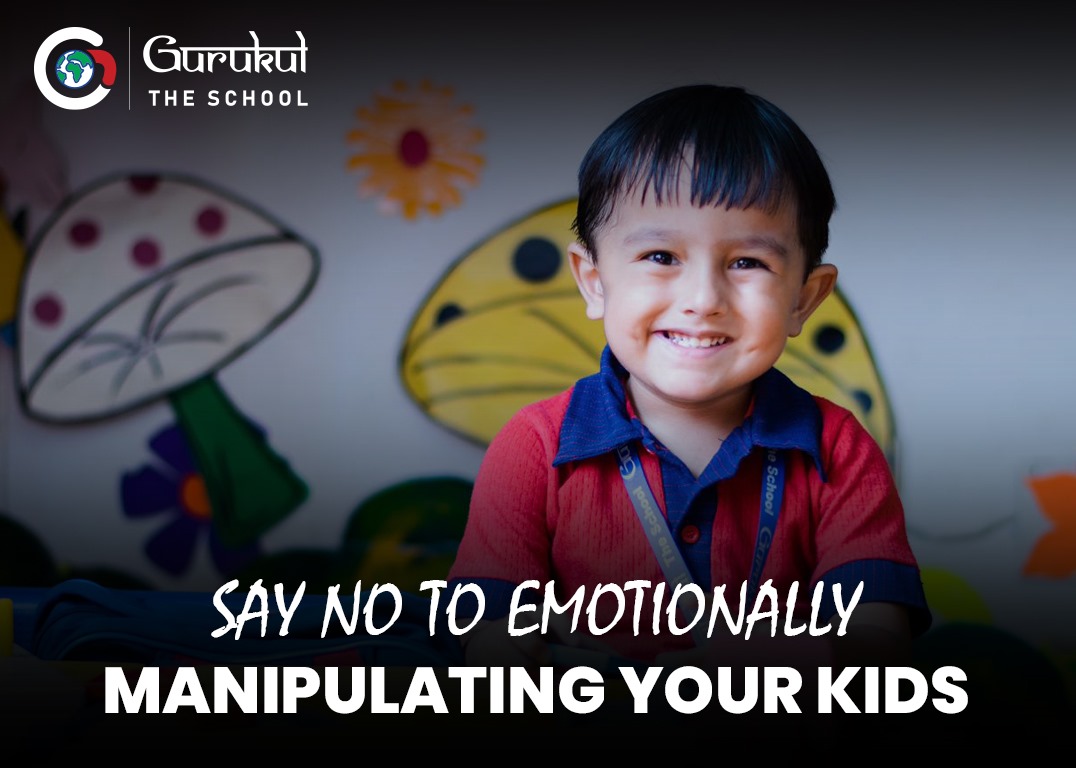Say NO to Emotionally Manipulating Your Kids
posted on Jan 24, 2024
Gurukul The School, one of the top 10 schools in Ghaziabad, we firmly believe that understanding the harm emotional manipulation does to children is the first step to preventing it. As parents

“Mumma won’t talk to you if you don’t finish your homework!” “I will be really sad if you don’t eat that breakfast.” Do such statements sound familiar to you? Do you take help of something similar to get your kids to do the required tasks? If yes, dear parents, you are indeed emotionally manipulating your kids!
Parenting is one of life’s most profound responsibilities, requiring you to nurture a life holistically. Since you are the primary caretaker, your actions, thought processes, speech, etc., directly influence the emotional well-being of your kids. However, it has been found that many parents, most likely unknowingly, resort to emotional manipulation tactics to discipline their kids or make them perform a specific action. While these tactics can generate instant and temporary results, they have a devastating influence on the child’s emotional and mental wellness.
For the uninitiated, emotional manipulation can be best described as using behaviors and tactics designed to coerce someone into doing what you want. Manipulative behavior can vary from one individual to another, but the most common tactics include gaslighting, guilt-tripping, triangulation, silent treatment, playing the victim, emotional blackmail, and conditional love. Parents may not always manipulate their kids consciously, but its occurrence cannot be entirely overruled.
Emotional manipulation often stems from the desire to maintain authority or achieve a specific desired outcome. At Gurukul The School, one of the top schools in Ghaziabad, we believe that irrespective of the reason for the need to exercise emotional manipulation, it should be best avoided at all costs. If parents continue emotionally manipulating their kids, consciously or unconsciously, it can have the following consequences:
-
Eroding Trust and Communication
All healthy parent-child relationships are based on trust. Once damaged, mending ties between the two can become incredibly challenging. When parents continuously use emotional manipulation tactics to get things done their way, children start doubting their intentions. Trust begins to slowly fade away as kids no longer trust the sincerity of their parent’s actions. If it continues for a long time, it can hinder the open communication between parents and children. Kids become more reluctant to share their life details and happenings as they believe their parents can use this information against them.
-
Creating Anxiety and Stress
One of the biggest reasons why we are urging the parents to indulging in emotional manipulation tactics is because it may lead to severe anxiety and stress in children. Kids who are frequently subjected to emotional manipulation start believing that they have to meet the emotional demands of their parents every time, and if they somehow fail to do so, they begin tagging themselves as a bad child. It takes a toll on their physical as well as mental health, raising their stress and anxiety levels. This increased stress and anxiety can show up in various forms, like disturbed sleep, mood swings, and various physical and cognitive issues.
Children spend most of their time with their parents. As such, parental actions, words, behavior, etc., influence them significantly and shape their perception of self. Constant emotional manipulation makes children feel guilty or responsible for their parent’s emotions, which can shatter their self-esteem. It leads to kids growing with a profound sense of inadequacy, making them believe they are responsible for others’ happiness throughout their life. Their sense of self-esteem gets damaged and starts affecting all areas of their life, personal and professional.
-
Distorted Understanding of Healthy Relationships
Parents are kid’s first teachers. This means it is only natural for children to observe and learn from their parents’ behavior. If kids get exposed to emotional manipulation from a young age, they may start viewing it as a normal, healthy, and acceptable part of any relationship. This distorted understanding of relationships can prevent them from establishing and nurturing truly healthy and love-centric relationships throughout their life. Its negative influence can also be witnessed in their future interactions with peers, family, friends, and even their own children.
-
Hindering Emotional Development
Emotionally manipulating kids can stifle their overall emotional development and growth. It has been seen that kids who continually give up to emotional manipulation begin to suppress their feelings and become emotionally reactive. It adds to their suffering in the long term as they may fail to establish and nurture meaningful relationships. They can also find it overwhelming to identify and manage their emotions efficiently.
Break the Cycle of Emotional Manipulation
At Gurukul The School, one of the top 10 schools in Ghaziabad, we firmly believe that understanding the harm emotional manipulation does to children is the first step to preventing it. As parents, it is crucial to take time and analyze your own actions, patterns, thought processes, etc., to determine whether you’re knowingly or unknowingly manipulating kids to get things done. You can consider beginning with self-reflection to find whether you’re inadvertently using emotional manipulation tactics. If yes, break the cycle by taking corrective measures. Engage in open communication with your kids and show empathy by putting yourself in their shoes.
Conclusion
At the surface level, emotional manipulation may look harmful only to children. However, in reality, it is disastrous for children as well as the parent-child relationship. Thus, it is important that, as parents, what you focus on is nurturing and supporting your kids’ emotional development and say no to manipulating them to get the results you want. Remember, your present-day actions will shape their future and decide what kind of a person they become upon growing up, so act cautiously.